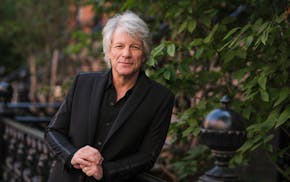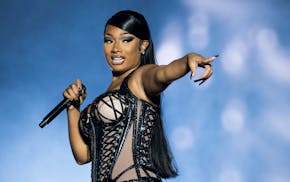Lydia Liza thinks she was just too young to speak up and sing out before now.
"As I got older, I learned to stick up for myself," said the St. Paul singer-songwriter, who's 26. "And I learned how much unfairness I really was living with."
A decade older, Annie Mack has a different perspective on the same problem.
"The language of consent did not even exist when I was growing up in north Minneapolis and being objectified as early as age 11," Mack said.
No matter their ages, Liza and Mack agree that now is the time to finally call out and weed out misogyny and sexual harassment and abuse in their industry and beyond.
They are two of 17 Minnesota singer-songwriters of varying generations, backgrounds, musical styles and gender identities who wrote songs about this overdue tide change for a new album, "#MeTooMpls."
Dropping next week following a virtual release party Thursday night, this vital and vibrant new compilation also features tracks by Tina Schlieske, Chastity Brown, Mary Bue, Mayda, Katy Vernon, Sarah Morris, Elska, Static Panic's Ro Lorenzen, Rogue Valley's Linnea Mohn, Ang Oase, Annie Fitzgerald and more.
It's available for pre-order via Bandcamp and benefits Planned Parenthood.
The collection initially got rolling last year after high-profile cases against musician Ryan Adams and movie mogul Harvey Weinstein, the direct target of Schlieske's seething "#MeTooMpls" song, "What Would You Pay (Dear Harvey)."
The project took on an even greater sense of immediacy this past summer, when a deluge of MeToo-style stories detailing abuse and harassment by men in the Twin Cities music scene flooded social media.
One of the results of that mass cleansing was Minnesota Public Radio's firing last week of 89.3 the Current disc jockey Eric Malmberg. Allegations — including rape and other physical and mental abuse — also emerged against many male musicians.
Those prompted public apologies and promises of change from the Rhymesayers record label, the Doomtree hip-hop collective and other musicians accused of being complicit.
Indie-rock singer/keyboardist Jourdan Myers, who records under the stage name JØUR, was still finishing the album's stormy closing track, "Won't Stop Me Now," when all those stories broke locally this summer.
"It made me and probably all of us feel we were doing this at the right time," Myers said.
All 17 contributors to the "MeTooMpls" album have their own stories of sexual harassment or worse.
In Myers' case, she said it was the "way too common story" of male musicians hiring her as a sidewoman for the wrong reasons.
"I'd go in thinking they wanted me to play with them because they thought I was talented and appreciated me as a musician," she said, "but really they wanted to make sexual advances toward me.
"And that's happened many, many times."
A blues-rocker who has gigged all around Minnesota, Mack said her most common frustration has been disrespect while performing in bars.
"I've played a lot of dives in my time, so I can't tell you how many times I've heard some dude yell, 'Show us your ...,' " Mack said.
Ro Lorenzen, singer in the buzzing electro-funk band Static Panic, said being a nonbinary/gender-fluid musician can sometimes add a form of homophobia/transphobia on top of abuse and harassment while performing in clubs.
"Our voices are part of these solutions, too, and I'm thankful to be included," said Lorenzen, who described their danceable "#MeTooMpls" track "Sides to Lonely" as "telling myself it's OK to feel the things I'm feeling, and to feel I deserve better treatment."
'Less afraid, less complicit'
Liza was one of the women whose stories of abuse sparked this summer's wildfire-like spread on social media.
The St. Paul native — who made national headlines in 2016 with her remake of the predatory-sounding holiday hit "Baby, It's Cold Outside" — said she was unwittingly groomed as a teenager into a sexual relationship with a much older musician.
"Once I started speaking up about it, I started hearing from other people immediately who had their own stories," Liza said, recounting "thousands" of personal messages just off her Instagram posts.
"My goal all along has been to make people less afraid of looking at themselves," she added, "less complicit with cases of sexual abuse and not allowing them to happen."
Liza's elegant, ambient song, "Apple in My Pocket," obliquely references her growing strength amid upheaval and chaos: "I feed the want and fight the need/ And I feed the call inside of me," she sings.
Mack's "Judge and Jury" is a slow-burning, Mavis Staples-flavored howler that bluntly decries anyone's judgment of a woman's (or anyone's) sexuality: "You get all up in arms trying to do my spirit harm/ Trying to do your best to shame me."
All of the songs were completed exclusively for this project. The idea originated with musician Mischa Suemnig and publicist Krista Vilinskis of Tinderbox Music, who asked participants for a new track based off the MeToo movement.
"Without any further guidelines," Vilinskis wrote in the news release for the album, "the artists delivered songs ranging from heartbreaking songs about surviving sexual assault to inspiring songs about feminist icons and their influence on their lives."
Among the more starkly personal contributions, Bue's "How to Forgive Your Rapist" furthers the song cycle about her own sexual assault case that began with her widely acclaimed 2015 "Petty Misdemeanor."
"It's not your fault/ You weren't asking for it," the Minneapolis-based, Duluth-reared indie-rocker sings in the acoustic track. (The "forgiveness" in the title is actually for herself).
Schlieske's Weinstein takedown is equally blunt: "How much would you pay for this life you stole away from me?" the Tina & the B-sides bandleader seethes.
"If 30 years ago someone had told me I'd be contributing to a project like this, with all these powerful female and nonbinary artists, I would have been knocked over with a feather," said Schlieske. She has more years — and tales of dealing with harassment — than any of the album's other participants, but she still thinks now is the right time for the compilation.
"Like most movements, I'm not sure people would really absorb what this all means had it happened any earlier. Women and the nonbinary/trans communities seem to have reached a tipping point of enough is enough, much like the Black Lives Matter movement."
Schlieske is one of the "#MeTooMpls" contributors — along with Morris and Mayda — who will perform full sets from the Hook & Ladder for Thursday's promotional/fundraiser party. The rest are pre-filmed clips that will be shown during the webcast, hosted by the Current's Andrea Swensson.
Tickets to the livestream ($25) include a digital copy of the album. CD copies of it are also being sold in local record stores to benefit Planned Parenthood.
While the "#MeTooMpls" musicians are disappointed they can't all get together on one stage during the pandemic to celebrate the collection's release — "That would've been one great party," said Myers — they all struck a celebratory note about uniting on record.
"I don't know everyone on this album personally, but I definitely feel a strong bond with them now," Mack said.
"There's still a long ways to go, but this is a great, big step toward progression," Lorenzen added.
Said Liza, "Power in numbers is a real thing. There's an incredible amount of power here."
Chris Riemenschneider • 612-673-4658
Olympian Kristi Yamaguchi is 'tickled pink' to inspire a Barbie doll

After 4 decades in music and major vocal surgery, Jon Bon Jovi is optimistic and still rocking
Rom-com author Emily Henry knows the secret to having a healthy relationship with love

